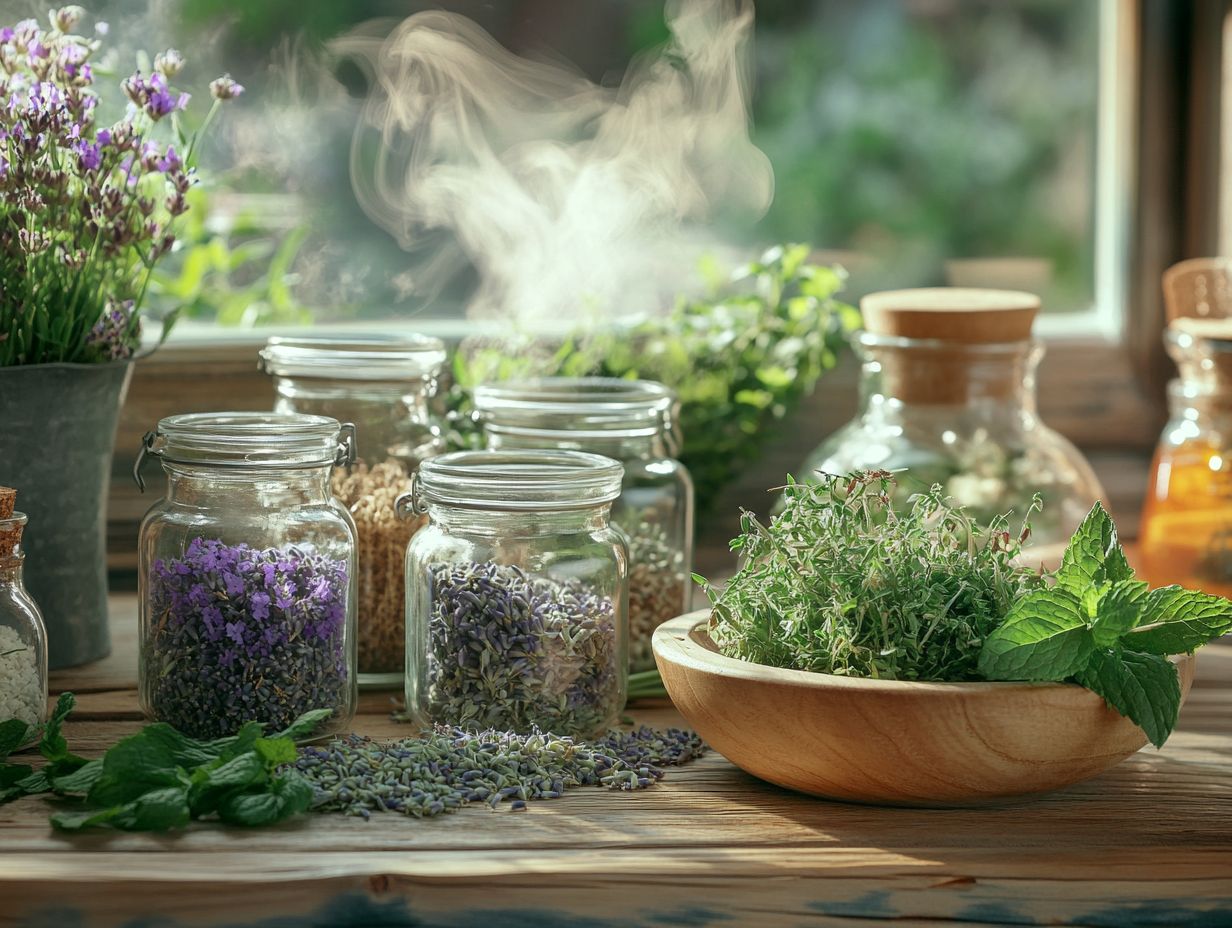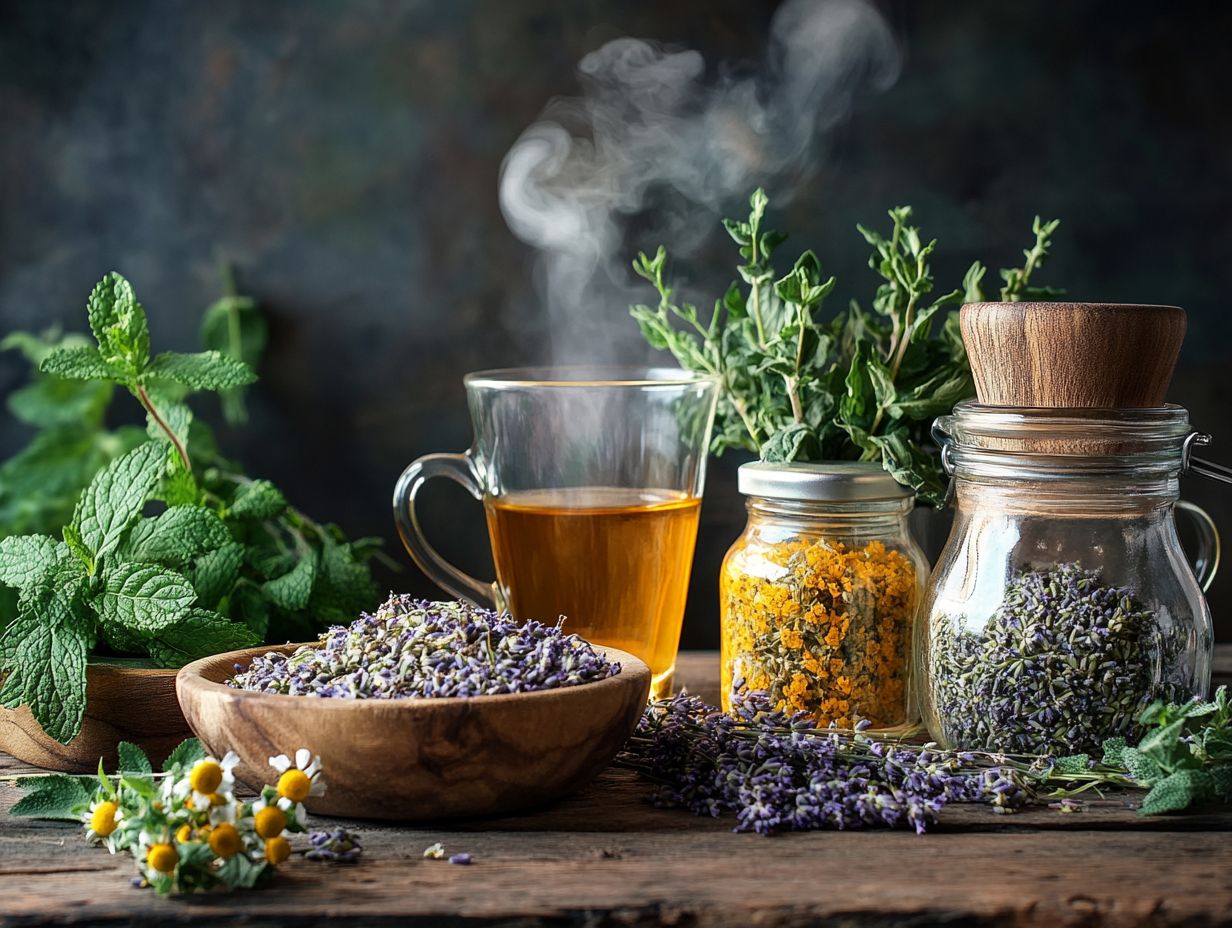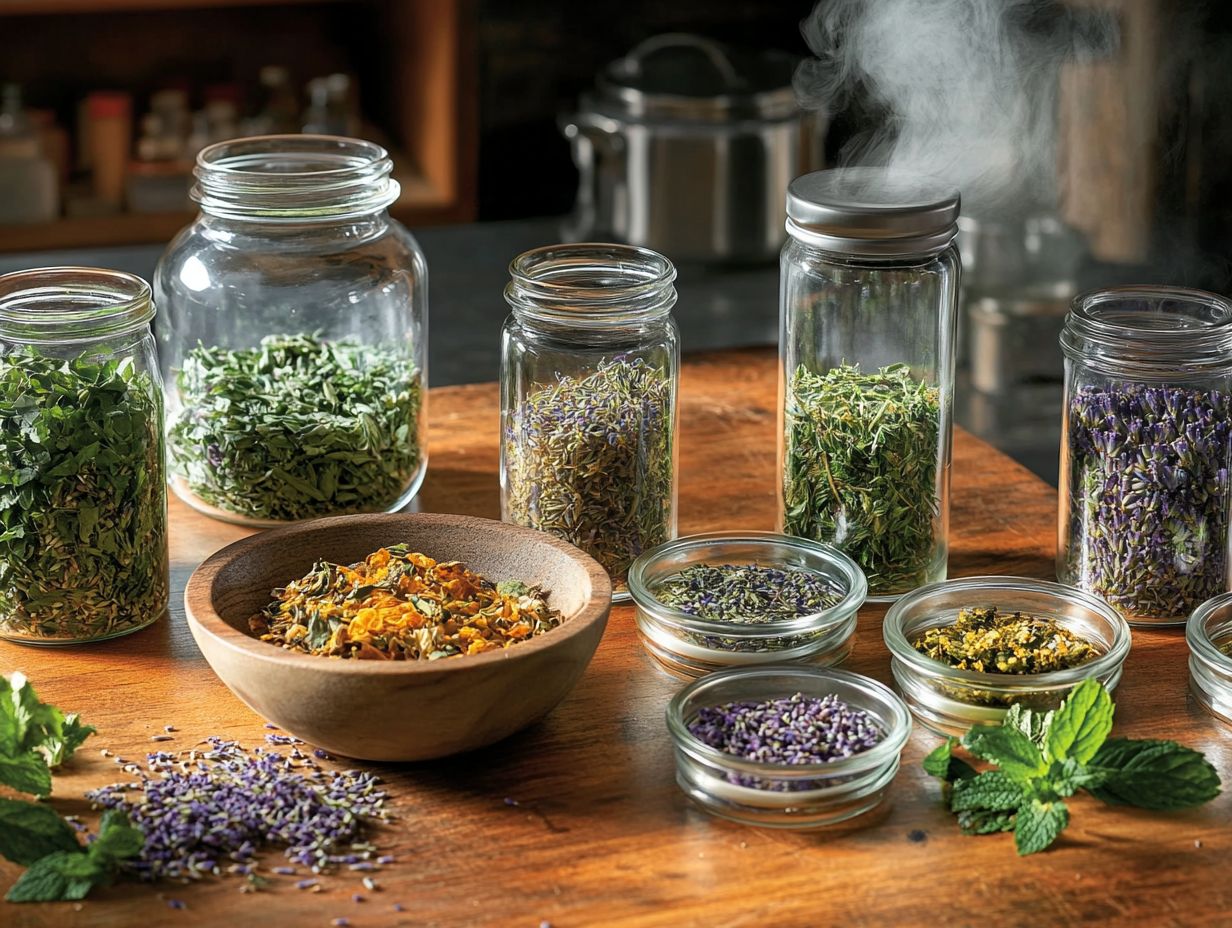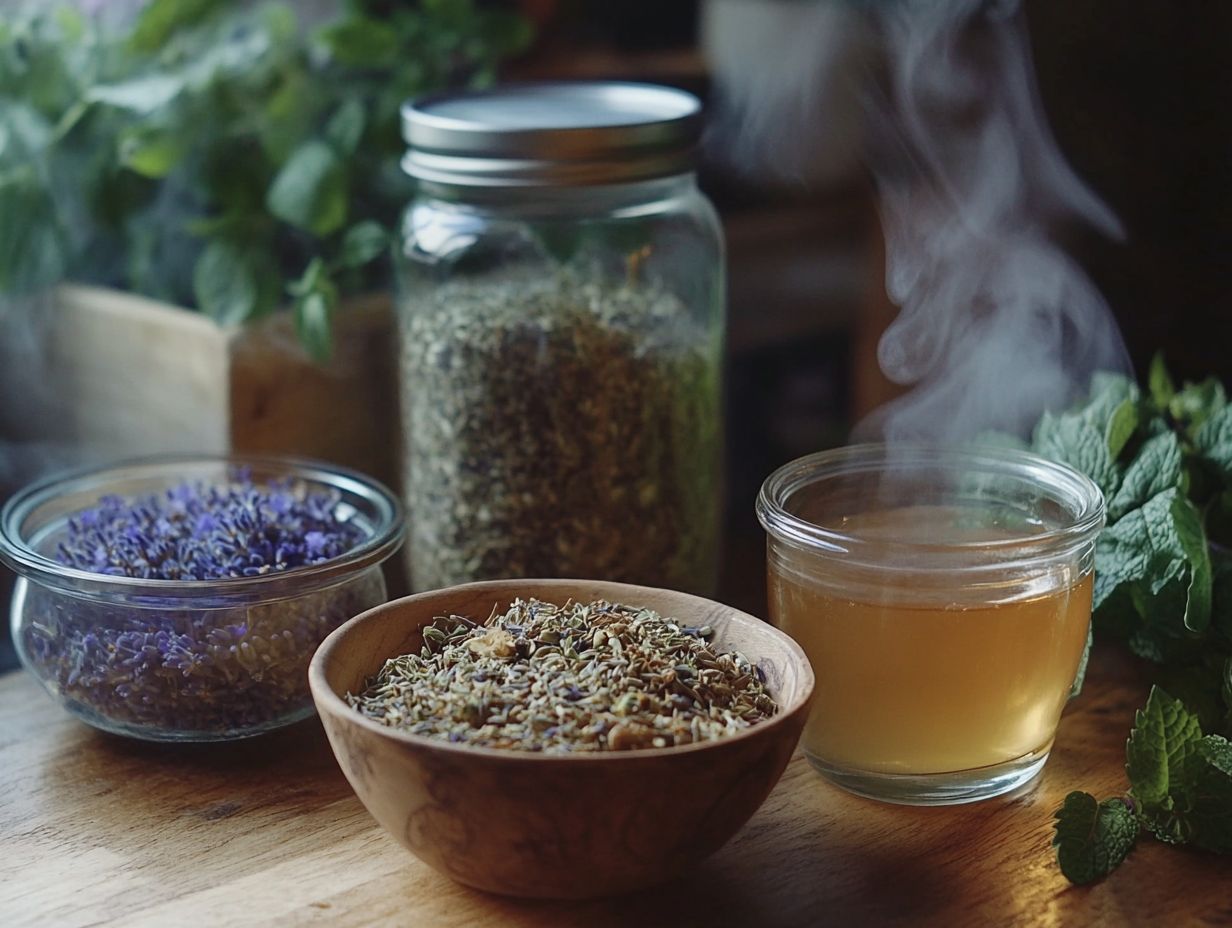Are you looking for a natural way to boost your hair’s health and shine? Herbal hair rinses might just be the solution you need.
These eco-friendly treatments nourish your locks and cater to specific hair types and concerns.
Discover the benefits of herbal hair rinses, from common herbs and their properties to a step-by-step guide on creating your own.
Additionally, essential tips will help ensure a safe and enjoyable experience.
Read on to transform your hair care routine!
Key Takeaways:

What are Herbal Hair Rinses?
Herbal hair rinses are natural hair care solutions composed of organic herbs and ingredients that have been utilized for centuries to promote healthy hair. Typically incorporating elements such as apple cider vinegar and conditioning herbal infusions, these rinses effectively address various scalp conditions and support hair growth.
An increasing number of individuals have begun to adopt homemade hair rinses as a key component of their hair care routines, using ingredients like chamomile flowers, rosemary essential oil, and moisturizing coconut milk.
The 2022 video contest recently highlighted innovative recipes and ideas for creating these rinses with natural ingredients.
Benefits of Using Herbal Hair Rinses

Incorporating herbal hair rinses into a beauty regimen can provide numerous advantages for both hair and scalp health, rendering them an essential component of any hair care routine.
These rinses not only facilitate natural nourishment but also effectively address specific scalp conditions that may contribute to hair loss or other related issues.
By utilizing a diverse array of organic herbs and natural ingredients, individuals can benefit from the restorative properties offered by herbal rinses, promoting healthy and vibrant hair.
Natural Nourishment for Hair
Natural nourishment for hair can be effectively achieved through the application of herbal vinegar hair rinses, which utilize ingredients such as apple cider vinegar and moisturizing coconut milk to promote hair growth and enhance shine. These rinses are rich in vitamins and minerals derived from organic herbs, offering a gentle yet powerful method to strengthen hair follicles and improve texture.
Incorporating these rinses into a regular hair care regimen can lead to a noticeable transformation in both softness and manageability. For example, the inherent acidity of apple cider vinegar assists in balancing the scalp’s pH level, thereby mitigating issues such as dandruff and fostering a healthy environment for hair growth.
The moisturizing properties of coconut milk not only hydrate the hair but also infuse the strands with essential nutrients that help retain moisture. Consequently, users frequently report experiencing shinier, stronger hair with reduced breakage, highlighting the significant benefits of utilizing such natural ingredients.
Specific Benefits for Different Hair Types

Different hair types can derive distinct benefits from the use of herbal hair rinses, rendering them versatile solutions for a variety of scalp conditions, hair loss, and overall hair health.
For instance, individuals with oily hair may find rinses containing apple cider vinegar effective in balancing scalp oil production, whereas those with dry or damaged hair can benefit from moisturizing herbal infusions such as chamomile and hibiscus, which serve to hydrate and strengthen the hair strands.
Additionally, individuals experiencing issues such as dandruff or scalp irritation might consider herbal solutions that include ingredients like rosemary or nettle, recognized for their anti-inflammatory properties and their potential to promote healthy hair growth.
By carefully selecting the appropriate herbal rinse tailored to their specific needs, individuals can effectively address concerns such as thinning hair and enhance overall scalp wellness, paving the way for vibrant and healthy hair.
Common Herbs Used in Hair Rinses
A diverse array of organic herbs can be utilized in hair rinses, each possessing unique properties that contribute to overall hair health, strength, and luster. Commonly used herbs such as chamomile, rosemary, and nettle have been traditionally acknowledged for their benefits in promoting hair growth, while lavender and calendula offer soothing properties for the scalp.
The incorporation of these herbs into homemade rinses can significantly enhance the efficacy of a natural hair care regimen and effectively address specific hair concerns.
Properties and Benefits of Each Herb

Each herb utilized in herbal hair rinses possesses unique properties that offer various benefits for hair growth and scalp conditions. Therefore, the selection of appropriate herbs is essential for achieving optimal results.
For instance, rosemary essential oil is recognized for its ability to promote circulation to the scalp, while chamomile flowers are known to soothe irritation and enhance shine, making them favored choices in herbal vinegar hair rinses.
Nettle leaves are abundant in silica and sulfur, which are crucial components that help strengthen hair and improve its overall integrity, while also effectively combating dandruff. Lavender, celebrated for its calming aroma, plays a significant role in alleviating stress and tension, which can indirectly support healthier hair growth.
Hibiscus is renowned for its conditioning properties and its ability to prevent excessive shedding, thereby contributing to a fuller mane. Incorporating these potent herbs into rinses not only addresses common scalp issues but also nourishes hair from root to tip, resulting in vibrant, healthier-looking locks.
How to Make and Use Herbal Hair Rinses
Creating and utilizing herbal hair rinses as do-it-yourself hair products represents an accessible and effective method for integrating natural ingredients into one’s hair care regimen.
Many individuals find it beneficial to experiment with diverse recipes, such as baking soda hair rinses for clarification or green tea hair rinses for enhanced antioxidant properties. This allows them to tailor their hair care practices according to their specific needs and preferences.
Step-by-Step Guide
Creating an effective herbal hair rinse necessitates a straightforward step-by-step approach that incorporates appropriate natural ingredients, such as apple cider vinegar, to achieve optimal results in hair care. The process begins with the selection of desired herbs, which should be combined with water or vinegar, adhering to specific instructions to ensure that the infusion is both safe and effective.
- Initially, measure approximately one cup of dried herbs, selecting options such as chamomile for lighter hair or rosemary for darker hair, to address specific hair concerns.
- Subsequently, bring four cups of water to a gentle boil and introduce the herbs, allowing them to simmer for no less than 20 minutes to extract their beneficial properties.
- Once the infusion has cooled, strain it to eliminate solid particles, ensuring a smooth application.
- To enhance shine and conditioning, incorporate a couple of tablespoons of apple cider vinegar, which is recognized for its pH-balancing qualities.
- Finally, transfer the herbal rinse into a clean bottle for convenient application during your hair care routine.
Tips and Precautions for Using Herbal Hair Rinses
While herbal hair rinses can be a valuable enhancement to one’s beauty regimen and natural hair care routine, it is essential to remain cognizant of potential allergic reactions and other necessary precautions.
Conducting a patch test prior to full application is advisable to prevent any adverse effects, thereby allowing individuals to enjoy the numerous benefits without compromising the health of their scalp.
Avoiding Allergic Reactions
Avoiding allergic reactions is essential when utilizing herbal hair rinses, as certain natural ingredients may trigger sensitivities in some individuals, particularly those with pre-existing scalp conditions. By being informed about potential allergens and conducting a patch test, users can mitigate risks and enhance their experience with herbal hair rinses.
Common allergic reactions may result from ingredients such as chamomile, lavender, or acetic acid, which can irritate sensitive skin or exacerbate existing conditions. It is important to recognize the signs of an allergic reaction, which may include redness, itching, or swelling at the application site.
To perform a patch test, one should apply a small amount of the herbal rinse to a discreet area, such as the inner elbow, and wait for 24 hours to observe any adverse reactions. Prioritizing natural ingredients involves not only selecting appropriate components but also ensuring their safe usage; therefore, individuals should always choose reputable sources and verify that the formulations do not contain hidden allergens.


